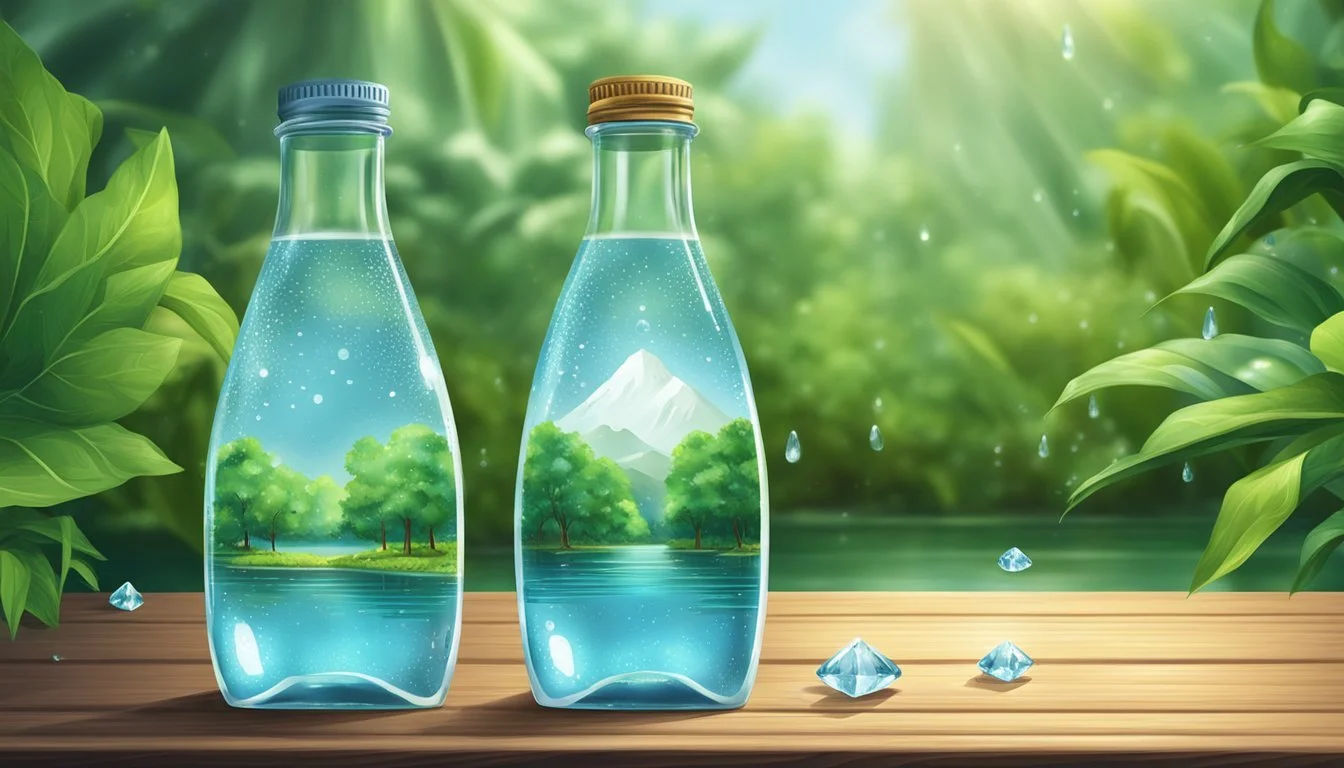Origin vs. Crystal Lake
Comparing the Top Bottled Water Brands
When it comes to choosing the best bottled water, Origin and Crystal Lake are two popular options that many people consider. Both brands have established themselves in the market, but they cater to different preferences and criteria. Origin prides itself on its pure and reliable taste, free from any artificial flavors or preservatives, making it a go-to choice for those who value natural water sources.
Crystal Lake, on the other hand, has attracted a loyal following despite mixed reviews. Some critics have questioned its overall quality, citing concerns about possible lingering aftertastes and the water's origin. Nevertheless, it remains a strong contender due to its widespread availability and consistent presence on store shelves.
For those prioritizing purity and taste, Origin is likely the better choice, offering a cleaner and more straightforward drinking experience. Readers interested in a deeper comparison of these brands and what sets them apart will find valuable insights in the details that follow.
Comparing Water Sources
When evaluating bottled water, it's essential to consider the origin, processing, and characteristics of the water sources. These factors heavily influence the taste, purity, and mineral content of the water.
Natural Spring Water
Natural spring water emerges from underground springs, and it is collected at the point where the spring naturally flows to the surface. Known for retaining its minerals, it often has a distinct taste.
Examples include Arrowhead and Ice Mountain, both sourced from mountain springs. Spring water is typically filtered naturally as it passes through rocks, enriching it with minerals such as calcium and magnesium. This type of water is valued for its natural mineral content and minimal human intervention.
Purified Water
Purified water undergoes extensive processing to remove impurities and contaminants. This process can include distillation, deionization, and reverse osmosis. Tap water is often the base before purification.
Origin is an example of a brand that uses purified water, promoting high standards of purity. Purified water may lack the natural minerals found in spring or mineral water due to the removal processes. It's characterized by its clean taste and uniform quality, making it a preferred choice for those concerned about contaminants.
Artesian and Mineral Water
Artesian water is drawn from confined aquifers under positive pressure. This type of water is appreciated for its natural filtration and mineral content. Fiji Water is a well-known example, sourced from an artesian aquifer in Viti Levu, Fiji.
Mineral water, like Acqua Panna, contains naturally occurring minerals and is bottled directly from its source. The mineral content varies based on the geographic and geological conditions of the source area. Mineral water offers a unique flavor profile due to its higher mineral content, which can provide health benefits and cater to specific taste preferences.
Water Quality and Safety
When comparing the water quality and safety of Origin and Crystal Lake bottled waters, critical factors include contaminant levels, adherence to regulations and standards, and the taste and smell characteristics.
Contaminant Levels
Origin and Crystal Lake are subjected to rigorous testing to ensure they meet safety standards. Both brands test for contaminants like lead, arsenic, pathogens, and PFAS. Origin touts its water as being free from detectable levels of lead and arsenic, making it a safe choice for consumers worried about these contaminants. Crystal Lake, on the other hand, emphasizes its purification process, effectively removing most pathogens and chemical contaminants, ensuring high water quality.
Regulations and Standards
Both Origin and Crystal Lake must comply with regulations and standards set by organizations such as the Environmental Protection Agency (EPA) and the Food and Drug Administration (FDA). Origin's filtration process meets EPA standards for safe drinking water, ensuring that their product is free from harmful chemicals. Similarly, Crystal Lake adheres to FDA regulations, guaranteeing that their water is consistently tested and inspected. Compliance with these stringent standards ensures that both brands provide safe and high-quality drinking water.
Taste and Smell
The taste and smell are key factors consumers consider. Origin is marketed for its pure and crisp taste, with no artificial additives. Users report that Origin has a slightly minerally taste, which some find refreshing. Crystal Lake also boasts a clean taste, emphasizing its neutral flavor profile. Many appreciate that it tastes nothing like plastic, which is a common issue in bottled water. Crystal Lake's water is processed to remove any off-putting odors, making for a pleasant drinking experience.
When comparing these brands, factors such as exact contaminant levels and user preference for taste and smell will vary, but both are committed to providing safe, high-quality water.
Health Benefits and Hydration
An analysis of health benefits and hydration properties will help determine whether Origin or Crystal Lake provides a better option for consumers. This includes examining the efficacy of each brand's hydration capabilities and the electrolyte and pH levels unique to each water type.
Hydration Efficacy
Proper hydration is crucial for bodily functions like temperature regulation and joint lubrication. Both Origin and Crystal Lake claim high efficacy in hydration. Origin emphasizes its natural spring sources, providing minerals that aid in fluid balance. Crystal Lake focuses on its purity and lack of contaminants, which ensures easy absorption.
Origin contains natural minerals that enhance hydration efficiency. These trace minerals can improve water uptake by cells, promoting better overall hydration. Crystal Lake, on the other hand, boasts stringent filtration processes, eliminating potential pollutants without losing essential hydration properties.
Electrolytes and pH Levels
Electrolytes such as sodium, potassium, and magnesium are essential for maintaining electrolyte balance and muscle function. Origin water contains naturally occurring electrolytes due to its spring source. This can be beneficial for those requiring electrolyte replenishment after physical activities.
Crystal Lake offers a different perspective, focusing on its ionization process to maintain optimal pH levels. Typically, it has a balanced pH that supports body homeostasis. Some consumers prefer it for this balance, believing ionized water is more beneficial for reducing acidity levels in the body.
Evaluating the specific attributes of Origin and Crystal Lake can guide consumers in choosing the water that best fits their health and hydration needs.
Environmental Impact
It's crucial to compare the environmental impact of Origin and Crystal Lake bottled waters. This comparison focuses on the materials used for bottling and the overall water footprint associated with each brand.
Bottle Materials and Sustainability
Origin uses single-serving plastic bottles typically made from polyethylene terephthalate (PET). While convenient, PET bottles are known for their significant environmental burden. On the other hand, Crystal Lake opts for glass bottles and boxed water alternatives, which are more environmentally friendly.
Glass bottles are reusable and recyclable, reducing the waste impact. Boxed water, often made from renewable materials, also presents a sustainable option. Consumers concerned about sustainability might prefer Crystal Lake for its environmentally friendly packaging.
Water Footprint
The water footprint of bottled water includes the entire lifecycle, from water extraction to bottling. For instance, in Barcelona, the full switch to bottled water would cost an additional $83.9 million and significantly strain resources.
Research shows that bottled water generally has an environmental impact 3,500 times greater than tap water. When comparing brands, it's essential to consider not just the production but also the resources required to transport and store the bottles. Crystal Lake's emphasis on local sourcing helps reduce its total water footprint compared to Origin's plastic bottle approach.
By examining these elements, consumers can make more informed choices about their bottled water purchases, considering both environmental and sustainability factors.
Brand Comparisons and Market Choices
Consumers are faced with a wide range of options when choosing bottled water, from premium brands with a high market position to affordable choices and niche specialty waters.
Premium Brands and Market Position
Premium bottled waters, such as Fiji, Evian, and Voss, dominate the market with their emphasis on purity and sophisticated branding.
Fiji water is known for its unique silica content, sourced from an aquifer in the Fiji Islands.
Evian offers natural spring water from the French Alps, notable for its smooth taste and mineral content.
Brands like Smartwater and Essentia also cater to health-conscious consumers with their vapor-distilled and ionized options, respectively. These brands maintain strong market positions due to their high-quality sourcing and appealing aesthetics.
Affordable Options
Affordable bottled water options are broadly available in grocery stores and commonly chosen by consumers seeking cost-effective hydration solutions.
Nestlé Pure Life, Dasani, and Aquafina are some of the well-recognized names in this category.
Pure Life by Nestlé is ubiquitous and offers a reliable, purified drinking experience.
Dasani, produced by Coca-Cola, and Aquafina, by PepsiCo, leverage their extensive distribution networks to ensure availability.
Poland Spring and Crystal Geyser also offer budget-friendly spring water options. These brands provide essential hydration without the premium pricing, making them staples in many households.
Niche and Specialty Waters
Niche and specialty waters appeal to consumers with specific tastes or environmental interests.
Icelandic Glacial and Waiakea stand out with their sustainability credentials and unique volcanic sources.
Mountain Valley Spring Water and Castle Rock offer water from protected springs, emphasizing natural purity and mineral balance.
San Pellegrino and Ethos Water provide unique mineral profiles and social impact missions, respectively.
Additionally, brands like CORE Hydration and LIFE WTR target wellness enthusiasts with balanced pH levels and added electrolytes. These specialty waters often attract a niche market willing to invest in unique qualities and ethical sourcing.
Consumer Insights and Recommendations
To help consumers choose between Origin and Crystal Lake bottled water, key aspects such as taste preferences and purchasing tips are essential. This information ensures that consumers make informed decisions based on both professional evaluations and practical advice.
Taste Preferences and Water Sommeliers
Taste is a crucial factor when selecting bottled water.
Origin is known for its crisp and clean flavor, derived from natural springs. Water sommeliers often praise it for its balanced mineral content, which contributes to its smooth taste.
Crystal Lake, on the other hand, has a slightly sweeter profile with a hint of minerality. Experts note that its taste appeals to those who prefer a subtle, refreshing water experience. This difference in flavor profiles means the choice largely depends on individual preferences.
Water sommeliers recommend trying both to determine personal taste. Some consumers might prefer Origin for its purity, while others might favor the unique taste of Crystal Lake. Ultimately, professional evaluations and individual tasting experiences guide the best choice.
Buying Guides and Tips
When purchasing bottled water, consider several factors.
Price and Value: Origin may be pricier due to its premium springs, while Crystal Lake often provides a cost-effective option without compromising quality.
Source and Purity: Check labels for water sources. Origin’s source is highlighted as a key selling point for its purity, whereas Crystal Lake’s detailed mineral content information can be appealing.
Environmental Impact: Consumers should also consider eco-friendly options. Both brands offer recyclable bottles, but some may have additional sustainability practices in place.
Availability: Depending on the location, availability can vary. It’s useful to know which local stores carry your preferred brand or if they offer online purchasing.
Storage and Expiration: Store bottled water in a cool, dark place to maintain taste and safety. Always check expiration dates to ensure the best quality.
By focusing on these practical tips, consumers can make a well-informed choice between Origin and Crystal Lake bottled waters.
The Bottom Line
When comparing Origin and Crystal Lake, the choice boils down to several key factors: taste, sourcing, mineral content, and price.
Taste: Many consumers find Origin's taste to be crisp and refreshing. Crystal Lake, though also highly rated, sometimes gets mixed reviews due to a slight tang that can be polarizing.
Sourcing: Origin sources its water from protected natural springs, ensuring purity and minimal processing. Crystal Lake, on the other hand, is known for rigorously maintaining high standards, but it's sourced from multiple springs, which may affect consistency.
Mineral Content: Both brands boast a balanced mineral profile. Origin has a slightly higher magnesium content, which some people prefer for its health benefits. Crystal Lake's sodium content is lower, making it a better option for those watching their sodium intake.
Price: Price points differ slightly. Origin tends to be on the pricier side due to its premium marketing and single-source origins. Crystal Lake offers more budget-friendly options without compromising much on quality.
Here's a quick comparison:
Factor Origin Crystal Lake Taste Crisp, refreshing Mixed reviews, slight tang Sourcing Single, protected springs Multiple springs Mineral Content Higher magnesium Lower sodium Price Premium pricing More budget-friendly
These factors help highlight the specific advantages and considerations for both brands. Individual preferences and priorities will ultimately guide the decision-making process.
More About Origin
Mountain Valley Spring Water vs Origin: Which Bottled Water is Better?
Origin vs Kirkland Signature: Which Bottled Water is Better?
Origin vs Richard's Rainwater: Which Bottled Water is Better?
Origin vs Whole Foods Italian Still Mineral water: Which Bottled Water is Better?
More About Crystal Lake
Aqua Carpatica vs Crystal Lake: Which Bottled Water is Better?
Cascade Mountain vs Crystal Lake: Which Bottled Water is Better?
Core Hydration vs Crystal Lake: Which Bottled Water is Better?
Crystal Geyser vs Crystal Lake: Which Bottled Water is Better?
Crystal Lake vs Essence pH10: Which Bottled Water is Better?
Crystal Lake vs Proud Source: Which Bottled Water is Better?
Hawaii Volcanic vs Crystal Lake: Which Bottled Water is Better?
Hawaiian Springs vs Crystal Lake: Which Bottled Water is Better?
Ice Mountain vs Crystal Lake: Which Bottled Water is Better?
Icelandic Glacial vs Crystal Lake: Which Bottled Water is Better?
Kirkland Signature vs Crystal Lake: Which Bottled Water is Better?
Liquid Death vs Crystal Lake: Which Bottled Water is Better?
Mountain Valley Spring Water vs Crystal Lake: Which Bottled Water is Better?
Nestle Pure Life vs Crystal Lake: Which Bottled Water is Better?
Poland Spring vs Crystal Lake: Which Bottled Water is Better?
Purely Sedona vs Crystal Lake: Which Bottled Water is Better?
Richard's Rainwater vs Crystal Lake: Which Bottled Water is Better?
San Pellegrino vs Crystal Lake: Which Bottled Water is Better?
Simple Truth vs Crystal Lake: Which Bottled Water is Better?
Solan de Cabras vs Crystal Lake: Which Bottled Water is Better?
Talking Rain AQA vs Crystal Lake: Which Bottled Water is Better?
Whole Foods 365 vs Crystal Lake: Which Bottled Water is Better?
Whole Foods Italian Still Mineral water vs Crystal Lake: Which Bottled Water is Better?








